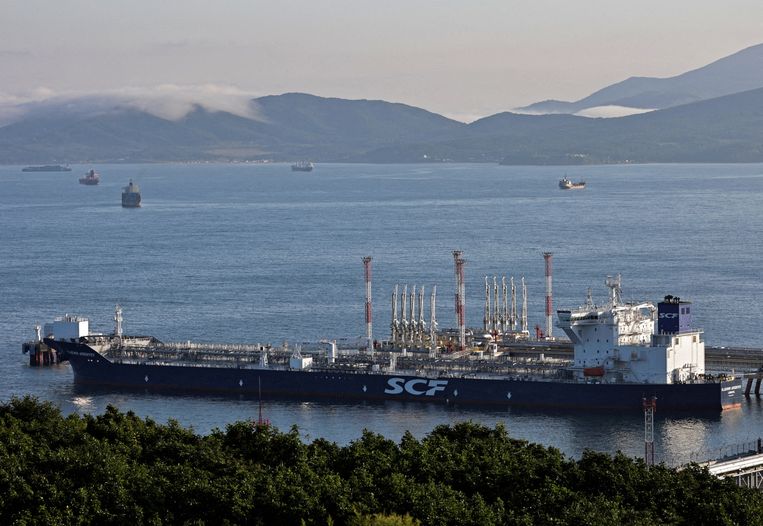What does ban mean?
Countries such as Canada, Japan, the United Kingdom and the United States, as well as Australia, agreed not to pay more than $60 per barrel of Russian oil.
The price cap should result in Russia earning less from selling oil, making it more difficult to finance the war in Ukraine. The high price limit has been negotiated for a long time. Ukraine and Poland, among others, have argued for a much lower ceiling of US$30. Greece, Malta and Cyprus chose a $70 limit because tankers from these countries carry 55 percent of Russian oil, according to IIF figures. Such a high ceiling would have no effect, because that is the price at which Russia now sells all of its oil.
A compromise was found at $60. The ceiling could be lowered if oil prices fall further.
Why is a roof necessary? Isn’t there already a ban?
To avoid price shock. There were fears that the European oil embargo, which took effect on Monday, would suddenly lead to a large amount of oil not reaching the global market. This is because the sanctions state that ship owners are not allowed to transport Russian oil. They can no longer insure their oil tankers.
A significant part of the transportation of oil from Russia, including insurance and financing, is carried out by European companies. As a result, countries outside the European Union will no longer be able to buy Russian oil. He feared that the already tight energy market would suffer a new blow.
With the combination of the European embargo and the cap, Russian oil is still allowed to go to countries outside the European Union, but they cannot pay more than $60 per barrel. Russia announced that it would suspend deliveries to customers who adhere to the price limit.
Russia produced eight million barrels per day before the war, much of which went to Europe. Immediately after the conquest, Europe began phasing out buying. Russian oil supplies by sea must stop completely on Monday, with the exception of diesel oil. The import of this important raw material for transport fuel ends next February. The embargo does not include oil flowing through pipelines to Europe, to prevent dependent economies in central and eastern Europe from reaching a standstill
Are bans and caps effective?
Little. The good news is that the West now has a tool to effectively pressure Putin, says the Brussels-based think tank Bruegel. However, Russian exports will decline slightly for the time being; Since the ban was announced in advance, producers and carriers have had the opportunity to change their supply lines. Moscow is now selling more oil to China and India, at a discount. These two countries do not share the price cap and will continue to buy Russian oil. Europe buys more oil from other producers.
And the ceiling does not bother Russia much either, because the country sells its oil at prices close to the ceiling. But the price of oil is now relatively low compared to the past few months. If prices rise as a result of lower Russian production, Moscow won’t benefit, the point is.
It happened with natural gas: Because Moscow slowly cut off supplies to Europe this year, prices exploded and Putin was able to make more income even while selling less natural gas. The price cap should prevent a recurrence with oil.
And does this work?
When the news was announced on Friday, the price had dropped slightly and is now 10 percent lower than it was a month ago. According to Washington, this is evidence that the roof is actually doing its job. This may be a bit overly optimistic: prices are falling mainly due to uncertainty about the Chinese economy, as the epidemic flares up again and lockdowns lead to social unrest.
China now buys about two million barrels of Russian oil a day. With the Chinese economy suffering from riots and lockdowns, it is uncertain whether the country will need more Russian oil in the short term. If Beijing does not buy more oil, Moscow may not be able to make up for the loss of demand from Europe. According to the International Energy Agency (IEA), Russia is expected to export 2 million barrels per day less in the second quarter of next year, a quarter of the original total.
… practically?
So it is uncertain whether the cap and ban will work in practice. Also because illegal shipments will happen. Market experts are already seeing different tankers turn black. They turn off their transponder (a transmitter that transmits a ship’s coordinates, among other things), so that they can’t be followed through websites like Marine Traffic. This allows these ships to store and transport unseen Russian oil.
Russian oil for India, for example, will also be mixed with other oil, after which it will no longer be possible to trace where it came from. “Russian oil is Russian oil as long as there is a Russian flag on the tanker carrying the material,” said a source at an energy company, who declined to be named because of his involvement in the trade. So Russian oil will continue to flow to Europe, though, most likely, in smaller quantities.







